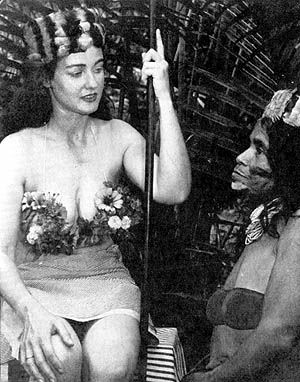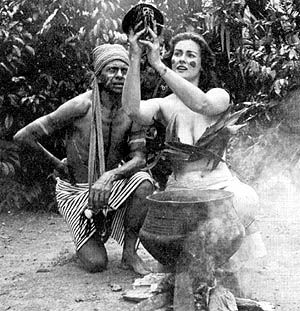Exploring wilds of Ecuador, MM's full-bodied
reporter becomes full-fledged tribal goddess in her most eye-mazing adventure.

"Jungle Jane--Queen of the Amazon"
by Jane Dolinger
from
Modern Man
Vol. 12, No. 9-141, 1963
MY NAME
WILL not he found in Burke's Peerage, but "Queen Jane" is known throughout
the Amazon as the white girl who ruled a savage Indian tribe deep in the
jungles of Ecuador. Admittedly, I will travel anywhere and do almost anything
for a story but this is one adventure I had not planned and one I do not
intend to repeat.
When I set out by Indian canoe
on one of my many trips into the Ecuador interior, I had no intention of
visiting the Machaqui tribe--but my guide followed the wrong river and
I found myself in the territory of these dreaded head-hunters. It was getting
too dark to turn back, so we set up camp for the night--without a fire.
With the moon riding high across the cloud-flecked sky, I heard the pounding
of Indian drums, and I knew that messages were being sent up and down the
river to advise the witch doctors that our group was near their main village
on the banks of the Rio Tiputini.
Early the next morning, we
tried to slip away. But as we rounded a bend in the narrow river, we were
intercepted by six canoes filled with painted Indians. They forced my canoe
to the river bank and in Quechua, the native tongue of all Amazon
tribes, told us bluntly that their brujo, or witch doctor, was expecting
us.
Prodded by their lances, my
guide and I hurried down a wide jungle trail. It was a mass of bright flowers,
and overhead in the trees were dazzling pink, white, purple, and black
orchids. Flitting through the branches were dozens of yellow and blue macaws,
long-billed toucans, and flocks of shimmering green parrots.
It took two hours to reach
the village--a dismal assortment of about 40 palm-thatched huts without
walls. We were halted in front of one hut from which dangled a grisly shrunken
head. From my experience in the Amazon, I knew that this was the sign of
the brujo and that within the next few minutes he would decide my
fate.
A gaudily painted young man--slender,
lithe, and wiry--emerged from the hut and studied me with his dark eyes.
"Do you speak my language?"
he asked in Quechua.
"Not too well," I replied,
"but enough, I hope."
He scratched the back of his
head, gave me the once-over, and then burst into a wide grin.
"Last night," he said, "the
drums warned that a woman was near our village, but I could not believe
it. We have seen many missionaries, but you are the first white woman to
come here...and now that you are here, I want to tell you that for many
weeks I have dreamed about a white goddess who would come among us to be
our queen."
I stood open-mouthed not knowing
if I should humor him or run. Either he was a playboy with a new line,
or he was simply superstitious like the rest. Whichever he was, he was
the man who called the shots; and knowing the Indian mind, I finally told
the brujo that I, too, had been having dreams and that I had traveled
to their village following a destiny over which I had no control. I could
pour it on as thick as anyone, I thought, and this was exactly what the
witch doctor wanted to hear. He nodded solemnly. Like all other tribes
I had visited over the past few years, the lives of the Machaquis are steeped
in superstition, and this which doctor was no different.
I looked up and studied the
shrunken head which hung grotesquely from a rafter of the hut. Three long
strings of jungle vine tied the mouth shut. Like the head-hunting Jivaros,
the witch doctors of the Machaquis sewed together the lips of their victims
to make certain that the spirits of the dead men could not escape to wreak
vengeance upon those who had mutilated their bodies. Yes, the brujo was
serious--deadly serious--and I had gotten myself involved, for better or
worse, beyond the point of backing out.
After the witch doctor left,
I was escorted by several Indian women to one of the huts where I was disrobed
and clothed in the colorful garments of the tribe. But I made one concession
to civilization. While most women were nude above the waist, I insisted
on covering my bosom with garlands of flowers. Like all Machaqui women,
my cheeks were painted with two red spots made from the juice of the achiote
fruit.
The witch doctor, whose name
was Sagino (meaning "wild boar"), was a man of action. That night,
the drums pounded. And by noon of the next day, nearly 400 Indians had
arrived to watch my coronation as "Queen of the Machaquis."
My guide had been instructed
in the use of my Rollei, and I put him to work photographing the procedure.
This was not only a great moment in my life--one which I wanted to record
on film--but also, I knew, the pictures would be necessary to prove it!
There were no white horses,
no gilded carriage, and no triumphal procession. But even a transcontinental
television hook-up would not have made me feel any more important as I
walked along a trail to a throne of palm fronds. I was escorted to a small
wooden bench draped in a piece of hand-woven material. The brujo
appeared and put on my head a crown of multi-colored bird feathers.
I do not know what I expected,
but I was pleased to learn that there was nothing more to the ceremony,
and that I would not have to go out into the jungle and slay a jaguar or
shrink someone's head. I was a bona fide jungle queen, and my bird feathers
were my authority.
Each day after my coronation,
I sat on the "throne" for an hour or two. I doled out to the women hair
ribbons, mirrors, combs, cheap lipsticks, bobby-pins, and other trinkets
which I always carry on my forays into the jungle. For the men, I had fish
hooks and cigarettes, and for the chiefs, gleaming new machetes. In turn,
the Indians brought me jungle fruits, colorful plumes of birds, neck laces
made of monkey bones and jaguar teeth, and most important, golden nuggets
wrapped in palm leaves. I learned later that some of the river beds in
Ecuador are repositories for nuggets washed down the slopes of the Andes.
The mother lode has never been found.
It was not all fun, however.
The food we ate could scarcely be called a gastronomical delight. A typical
dinner consisted of banana soup, boiled boa snake, fried fish (with entrails
intact), sweet potatoes, toasted gusanos (grubworms), wild honey,
and chicha--a vile and potent brew. To see this food prepared was
enough to turn my stomach. Young boa snakes, six to eight feet long, were
first decapitated. Their still-writhing bodies were then dumped into clay
pots filled with boiling fat. After being cooked for about a half-hour,
they were fished out, cut into small pieces, and served.
I might, however, have accumulated
a fortune in gold nuggets had not sex reared its ugly (in this case) bead.
On the fifth night of my rule, Sagino told me that all Machaquis had accepted
me as their queen. They now wanted to make sure that there would be a successor.
Sagino, as brajo, had been chosen by the chiefs to father my child.
Luckily, I had anticipated
something like this when I first met Sagino, so I did not act alarmed.
When a white woman lives with savage tribes, they invariably want to find
her a suitable husband, because nothing is so unnatural to them as to have
in their midst a childless woman.
I told Sagino I would be happy
to comply with the wishes of his tribe. However, first there were certain
acts which I had to perform alone in order to purify myself for the matrimonial
couch. I clothed these acts in secrecy, claiming that they must be accomplished
for the good of all the people of the tribe. I explained very carefully
that early next morning I would leave in one of the canoes for a secret
destination, there to make certain sacrifices, and bathe in the pure water
of one of the many lakes in the vicinity. I would return within three days.
I also told Sagino that my
guide, who served as my personal servant, would accompany me for my own
protection.
When Sagino agreed, I breathed
again. He even promised that as a wedding gift, he would give me a pocketbook
made of monkey fur, twenty parrots, and a new hut.
I almost regretted having
to deceive the Machaquis, but I also knew what life would be like among
them. My short-wrap-around skirt and flowered brassiere were hardly sufficient
to protect my body from the bites of swarming, tiny black flies who bit
harder than mosquitos and left scars that often remained for a year. The
huts were always filled with clouds of smoke, and we slept on bamboo slats
without covers and in the same clothes we had worn each day. Then, there
was the food. I decided that jungle life could never compare with Paris
or London.
Next morning, while the village
was still asleep, I quietly hurried into my slacks, blouse, and jungle
boots and followed the trail leading to the river. My guide was waiting
for me in the canoe. We hurriedly paddled upstream in the direction of
Puerto Napo, expecting at any time to hear the drums signaling natives
to stop us. But the drums never sounded.
It had been a thrilling experience,
but five days as "Queen of the Machaquis" had been more than enough.
Sagino did not know it, but
I had abdicated my throne.
More Essays>>>
|

